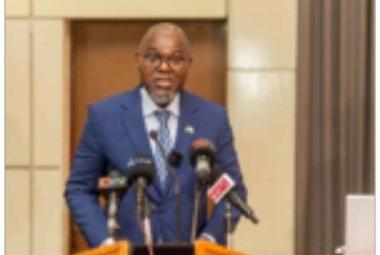By Isatou Fofana
In the ever-evolving landscape of the entertainment industry, the issue of tobacco advertisement, promotion, and sponsorship has become a subject of significant concern.
The Non Communicable Diseases (NCDs) Unit, under the Ministry of Health last week held a coordination meeting with film producers and representatives of the film and production sectors on tobacco advertisement, promotion, and sponsorship during their various filmmaking processes.
Speaking at the meeting, NCD Programme Manager, Mr. Omar Badjie, noted that the prevalence of tobacco-related imagery and branding in film productions has long been a point of contention.
“While the artistic merit and creative expression of filmmakers must be respected, we also recognise the substantial impact that such depictions can have on the public, particularly on youth. We have convened this coordination meeting to address the complexities surrounding this matter and explore potential avenues for responsible and ethical practices,” Badjie asserted.
He emphasised that it is the collective responsibility of all stakeholders within the film making industry to strike a balance between artistic freedom and the promotion of tobacco products in their films.
Mr. Momodou Gassama, World Health Organisation (WHO) National Profession Officer on Health Promotion, indicated the temptation of financial support from tobacco companies while urging for the collective recognition of the ethical problem it presents.
Gassama said there is an established set of guidelines and best practices that would govern the portrayal of tobacco products and their associated elements within the film and production industry. “These guidelines would aim to minimise the frequent showcasing of tobacco use, while still allowing for the authentic representation of societal realities,” he added.
The Director of Health Promotion and Education, Mr. Michael Mendy said that tobacco usage in this country is a growing public health concern; that effective strategies are put in place to curb the importation and consumption of tobacco products within the country.
In a similar but separate engagement, the unit also hosts relevant government officials from various ministries on measures to curb the indiscriminate usage of tobacco products in public spaces.
Commissioner Alagie Kinteh of The Gambia Police Force stated the importance of the coordination meeting, and said it represents a crucial moment in the nation’s pursuit of a healthier, tobacco-free future.
According to him, the meeting identifies the current challenges hindering the successful implementation of tobacco control measures, and the formulation of practical solutions that can be efficiently executed.
“This meeting presents a crucial opportunity to devise a comprehensive action plan that aligns with the nation’s commitment to promoting the well-being of its citizens”, he said.







